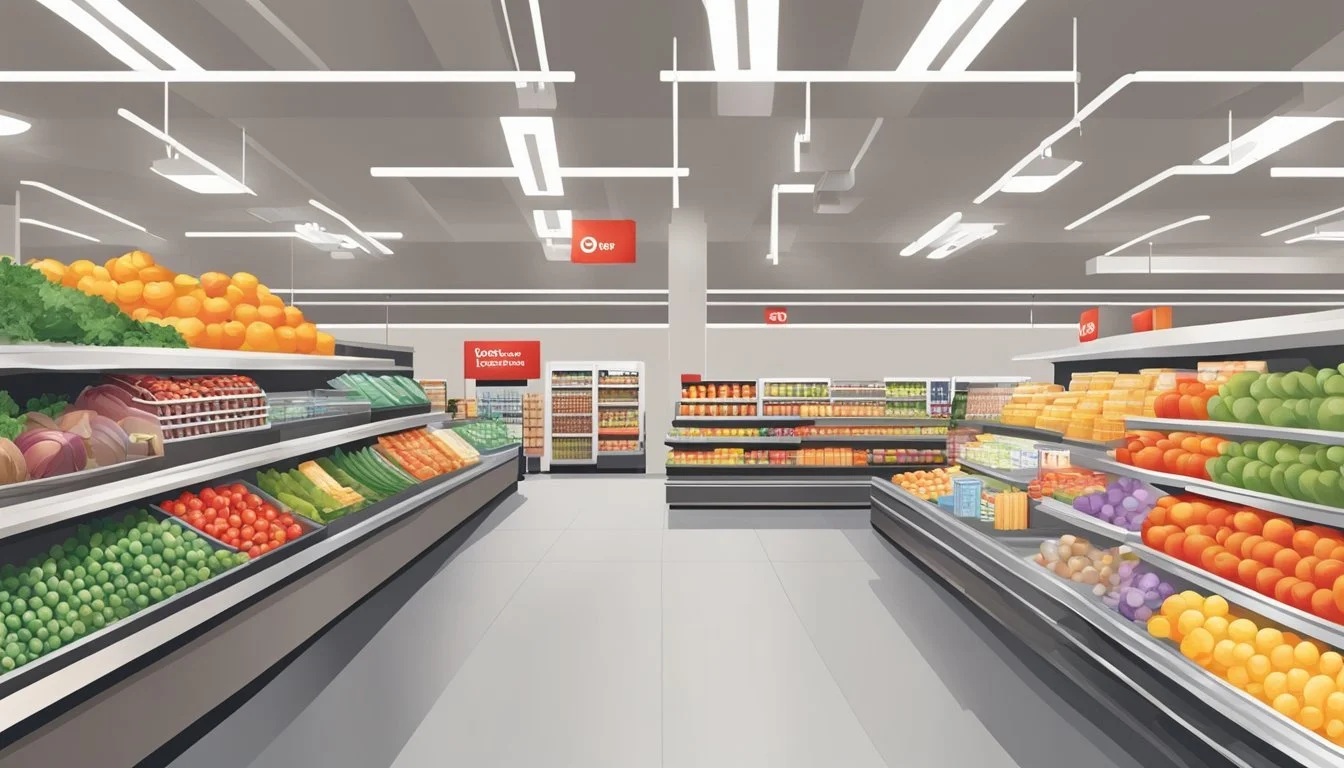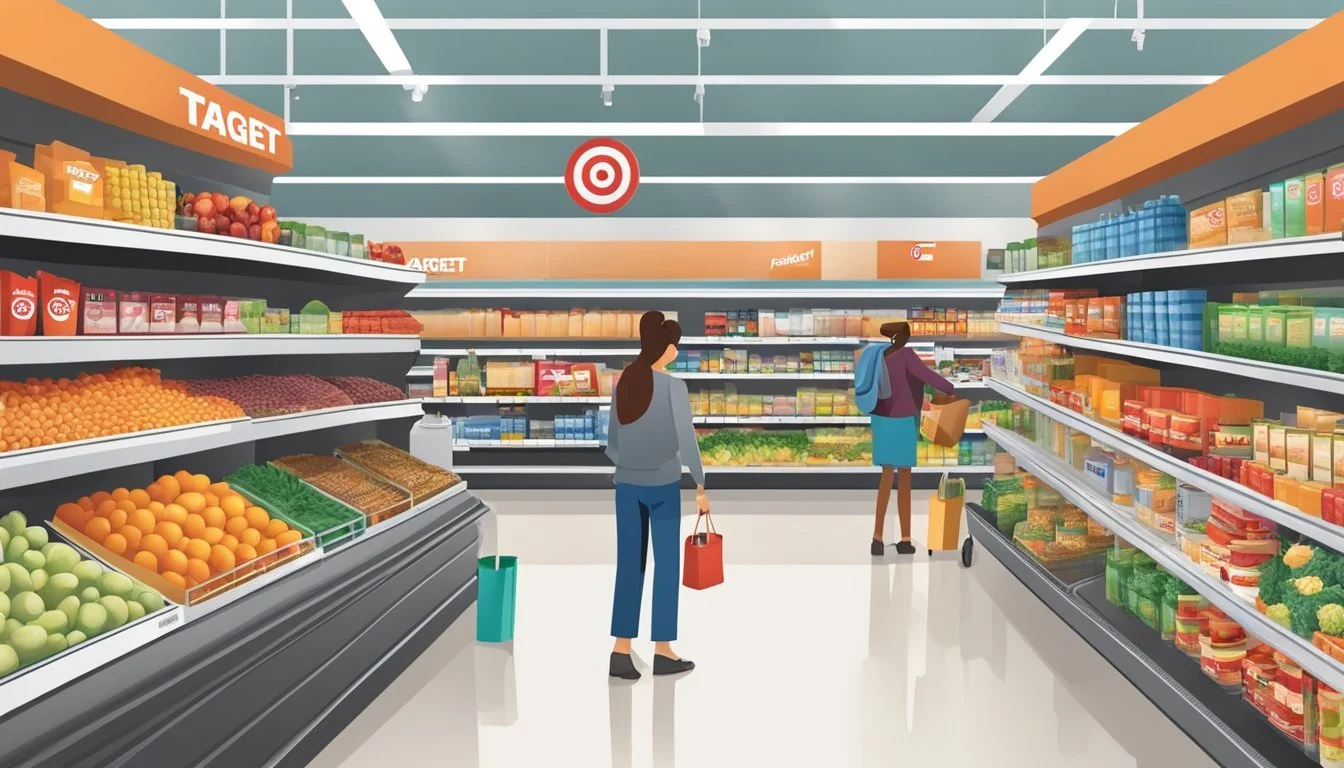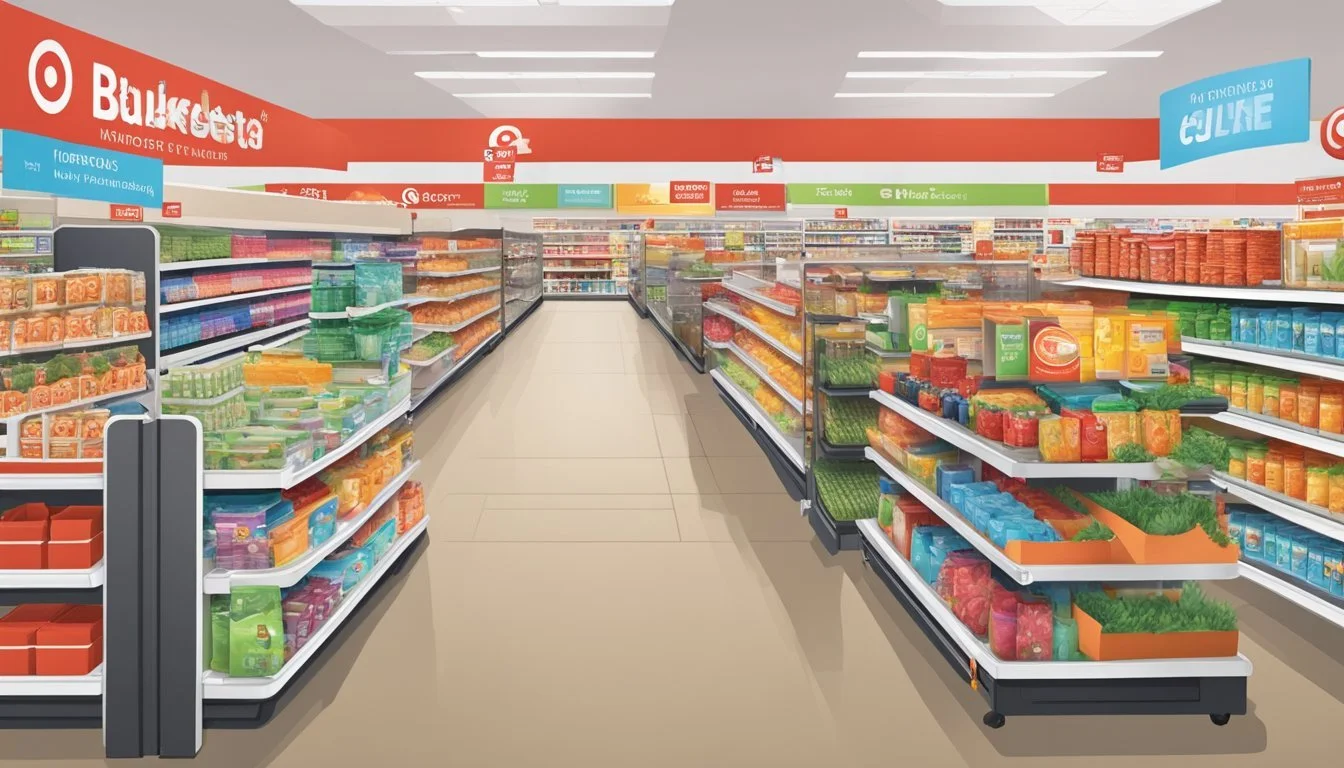Target vs Smart & Final
A Comprehensive Comparison of Price, Selection, and Quality
When choosing where to shop for groceries, price and quality are key factors. Target and Smart & Final are two popular options that offer different shopping experiences. Target is known for its wide range of products beyond groceries, while Smart & Final caters more specifically to food and household items.
A price comparison reveals that Target generally offers lower prices than Smart & Final, with one study finding Target to be about 11% cheaper overall. This difference can lead to significant savings for regular shoppers. Target's everyday prices tend to be more competitive, even when Smart & Final has items on sale.
Both stores have their strengths. Target excels in offering a diverse selection of non-grocery items alongside its food products. Smart & Final, on the other hand, specializes in bulk purchases and restaurant-quality goods. Shoppers may find that combining strategic purchases from both stores could maximize savings and product variety.
Company Overviews
Target and Smart & Final are two distinct players in the retail grocery landscape. Each company has carved out its own niche and approach to serving customers.
Target's Market Presence
Target is a major U.S. retailer known for its wide range of products beyond groceries. The company operates over 1,800 stores across all 50 states. Target's grocery offerings are part of its broader "one-stop-shop" strategy.
Target's food and beverage section typically occupies about 20-30% of store space. The retailer focuses on a curated selection of grocery items, including fresh produce, meat, dairy, and pantry staples.
Target has invested heavily in private-label brands like Good & Gather, which offers high-quality food products at competitive prices.
Smart & Final's Business Model
Smart & Final positions itself as a hybrid retailer, blending elements of a warehouse store and a traditional supermarket. The company operates over 250 stores, primarily in the western United States.
Smart & Final caters to both household consumers and small businesses. Its stores offer bulk quantities alongside regular-sized items, providing flexibility for different customer needs.
The retailer emphasizes value pricing and a no-frills shopping experience. Smart & Final's product mix includes a wide variety of food items, cleaning supplies, and foodservice equipment.
Smart & Final's private label, First Street, spans numerous product categories and aims to offer quality at competitive prices.
Product Range Comparison
Target and Smart & Final offer distinct product selections tailored to different shopper needs. Their inventory varies in key categories like produce, meats, organic options, dairy, and prepared foods.
Quality of Produce at Both Stores
Target emphasizes fresh, high-quality produce with an appealing presentation. Their fruits and vegetables are typically well-stocked and visually attractive. Smart & Final's produce section focuses more on bulk quantities and value pricing.
Target often carries a wider variety of specialty and seasonal items. Smart & Final tends to stock staple produce items in larger quantities.
Freshness can vary at both stores. Target generally maintains stricter quality control, while Smart & Final may offer deeper discounts on items nearing expiration.
Deli and Fresh Meats
Smart & Final excels in bulk meat options, catering to both households and small businesses. They offer large packs of chicken, beef, and pork at competitive prices.
Target's meat selection is more limited but focuses on higher-grade cuts and organic options. Their deli section provides pre-sliced meats and cheeses for convenience.
Smart & Final's deli area is minimal, mainly offering packaged cold cuts. Target's deli counters in some locations provide made-to-order sandwiches and prepared salads.
Availability of Organic Produce
Target has made significant strides in expanding its organic produce offerings. They stock a variety of organic fruits, vegetables, and herbs under their Good & Gather brand.
Smart & Final's organic selection is more limited. They carry some basics like organic apples, carrots, and salad greens, but the range is not as extensive as Target's.
Target often prominently displays organic items, making them easy to find. Smart & Final may integrate organic options within their regular produce section.
Pricing for organic items tends to be more competitive at Target, especially when on sale or with loyalty program discounts.
Diversity of Dairy Products
Both stores offer a range of dairy essentials like milk, eggs, butter, and yogurt. Target typically has a more diverse selection of specialty and plant-based dairy alternatives.
Smart & Final focuses on larger quantities and bulk packaging of dairy items. They excel in providing restaurant-sized containers of milk, cream, and eggs.
Target's cheese selection includes artisanal and imported varieties. Smart & Final offers more basic cheese options, often in larger package sizes.
For specialty items like kefir or European-style butter, Target generally has a broader selection. Smart & Final concentrates on staple dairy products in family and commercial sizes.
Frozen Foods and Prepared Foods
Target's frozen food section emphasizes convenience and variety. They stock a wide range of frozen meals, vegetables, pizzas, and desserts, including many name-brand options.
Smart & Final's frozen selection caters more to bulk buyers. They offer large bags of frozen vegetables, multi-packs of frozen entrees, and foodservice-sized ice cream containers.
Target carries a growing selection of premium frozen meals and plant-based options. Smart & Final focuses on family-sized frozen dishes and basic ingredients.
In prepared foods, Target often has a broader range of grab-and-go meals, salads, and sandwiches. Smart & Final's prepared food options are more limited, primarily consisting of rotisserie chickens and basic deli items.
Pricing Strategies and Savings
Target and Smart & Final employ distinct pricing approaches to attract shoppers. Both stores offer opportunities for savings, but their strategies differ in key ways.
Everyday Prices and Discounts
Target maintains competitive everyday prices on many grocery items. Their pricing tends to be lower than Smart & Final for many products. A price comparison found Target's total basket cost was about 11% less expensive than Smart & Final's.
Target's REDcard provides an additional 5% discount on purchases. Smart & Final counters with periodic sales and promotions. They often have items marked down, but these discounts may not always beat Target's regular prices.
Store Brands and Price Difference
Both retailers offer store brand products at lower price points. Target's Good & Gather and Market Pantry lines provide quality alternatives to national brands. Smart & Final's First Street brand spans many categories.
Target's store brands are typically priced very competitively. Smart & Final's private label offerings can provide savings, but may not always undercut Target's prices. The price gap between store and national brands varies by product category.
Loss Leaders and Weekly Specials
Smart & Final frequently uses loss leaders to draw customers. These deeply discounted items, often staples like milk or eggs, aim to increase store traffic. Their weekly ad features rotating specials across departments.
Target takes a different approach. While they run weekly promotions, their focus is on everyday low prices rather than dramatic loss leaders. Target's Cartwheel program offers digital coupons and personalized deals to frequent shoppers.
Both stores' apps allow customers to browse current specials and clip digital coupons for additional savings. Shoppers can maximize value by timing purchases with promotional cycles at each retailer.
Shopping Experience
Target and Smart & Final offer distinct shopping experiences, each catering to different customer needs. Their store layouts, checkout processes, and customer service approaches shape how shoppers interact with the brands.
Store Layout and Design
Target stores typically feature a modern, sleek design with wide aisles and clear signage. The layout encourages browsing, with strategically placed displays showcasing trendy items and exclusive collections.
Smart & Final adopts a warehouse-style layout, prioritizing functionality over aesthetics. Aisles are spacious to accommodate bulk purchases, with a focus on efficiency for shoppers seeking large quantities.
Target's grocery section is often integrated within the larger store, while Smart & Final dedicates most of its floor space to food and household essentials.
Checkout Efficiency
Target offers multiple checkout options, including traditional lanes, self-checkout kiosks, and mobile payment through their app. During peak hours, they often open additional registers to manage customer flow.
Smart & Final typically has fewer checkout lanes but aims for quick transactions. Their registers are designed to handle large orders efficiently, catering to both individual shoppers and business customers.
Both stores have implemented contactless payment methods to speed up the checkout process and enhance convenience for customers.
Customer Service Quality
Target emphasizes personalized customer service, with staff members available throughout the store to assist shoppers. They often provide product recommendations and help locate items.
Employees are generally knowledgeable about store layouts and current promotions.
Smart & Final's approach to customer service is more utilitarian. Staff members are trained to efficiently handle inquiries about bulk purchases and business accounts.
While less focused on creating a curated shopping experience, Smart & Final's team is typically well-versed in inventory and can quickly direct customers to specific products.
Accessibility and Convenience
Target and Smart & Final offer different levels of accessibility and convenience to shoppers. Their store locations and delivery options can significantly impact the shopping experience for families and individuals.
Location and Store Proximity
Target boasts a larger network of stores across the United States, with over 1,800 locations nationwide. This extensive presence makes Target more accessible for many shoppers, especially in suburban areas. Target stores are often found in shopping centers and near residential areas, making them convenient for quick trips.
Smart & Final has a more limited presence, with around 250 stores primarily located in California, Arizona, and Nevada. This regional focus means Smart & Final may be less accessible for shoppers outside these areas. However, in their core markets, Smart & Final stores are strategically placed to serve both residential and commercial customers.
Grocery Delivery Options
Target offers multiple grocery delivery options through its partnership with Shipt. Customers can choose same-day delivery for a wide range of grocery items, household essentials, and other Target products. The service is available in most areas where Target stores are located, providing convenience for busy families.
Smart & Final provides delivery services through third-party platforms like Instacart. This allows customers to order groceries and have them delivered to their homes. The availability of delivery may vary depending on location and local partnerships.
Both stores also offer curbside pickup options, allowing customers to order online and collect their groceries without entering the store. This service has become increasingly popular, especially for families looking to save time on their shopping trips.
Brand Comparison
Target and Smart & Final have distinct brand identities that influence consumer perceptions and market positioning. Their reputations and customer ratings provide insights into how shoppers view each retailer.
Consumer Perception of Target and Smart & Final
Target is often seen as a trendy, upscale discount retailer. Its "Expect More. Pay Less." slogan resonates with budget-conscious shoppers who still want quality products. Target's private label brands like Good & Gather and Up & Up are popular with consumers seeking affordable alternatives to national brands.
Smart & Final, on the other hand, is viewed as a no-frills warehouse store. It appeals to price-sensitive shoppers and small business owners. The store's First Street brand offers basic staples at competitive prices.
Market Research and Customer Ratings
Market research firms consistently rank Target higher in customer satisfaction compared to Smart & Final. Target scores well in areas like store cleanliness, product selection, and customer service.
Smart & Final receives lower ratings but is praised for its bulk buying options and competitive pricing on certain items. Consumerpedia reports that Smart & Final's strengths lie in its wholesale offerings and restaurant supply products.
Researchers note that Target's investment in store design and e-commerce capabilities has boosted its brand image. Smart & Final has focused on expanding its fresh produce selection to improve customer perception.
Overall Summary
Target and Smart & Final both offer grocery options for consumers, but with distinct approaches. Target provides a wider range of products beyond groceries, appealing to shoppers seeking variety. Smart & Final focuses more on bulk items and foodservice supplies.
Price comparisons show Target often has lower everyday prices on common grocery items. A sample comparison found Target's total was 11% less expensive than Smart & Final for the same basket of goods.
Smart & Final frequently runs sales, which can provide good deals on specific items. However, their regular prices tend to be higher than Target's, especially for meat products.
Target's broader appeal and lower regular prices give it an edge for many shoppers. Smart & Final may be preferable for those needing bulk quantities or specific foodservice items.
Both stores have their strengths, and the best choice depends on individual shopping needs. Consumers benefit from comparing prices and sales at both retailers to maximize savings on their grocery purchases.






